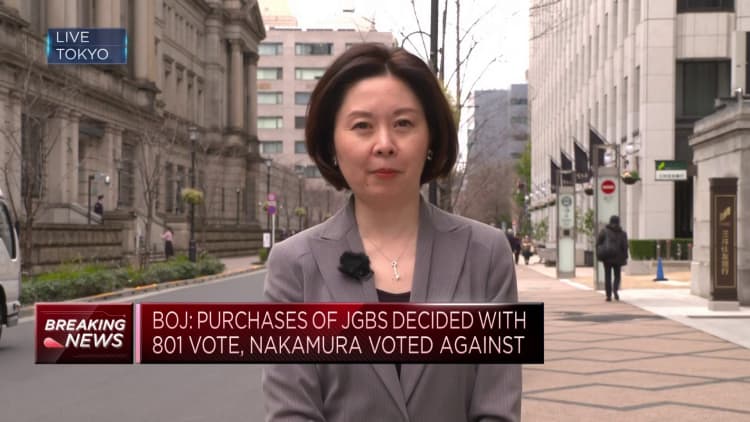An editorial montage of the Japan flag and Japanese yen cash bank notes
Javier Ghersi | Moment | Getty Images
Japan’s central bank raised interest rates on Tuesday for the first time since 2007, ending the world’s only negative rates regime on early signs of robust wage gains this year.
The Bank of Japan though cautioned it’s not about to embark on aggressive rate hikes, saying that it “anticipates that accommodative financial conditions will be maintained for the time being,” given the fragile growth in the world’s fourth-largest economy.
The BOJ raised its short-term interest rates to around 0% to 0.1% from -0.1%, according to its statement at the end of its two-day March policy meeting. Japan’s negative rates regime had been in place since 2016.
The BOJ also abolished its radical yield curve control policy for Japanese sovereign bonds, which the central bank has employed to target longer-term interest rates by buying and selling bonds as necessary.
The central bank though will continue purchasing government bonds worth “broadly the same amount” as before — currently about 6 trillion yen per month.
It would resort to “nimble responses” in the form of increased JGB purchases and fixed-rate purchases of JGBs, among other things, if there is a rapid rise in long-term interest rates.

Scaling back of its radical asset purchases and quantitative easing, the BOJ said it would stop buying exchange-traded funds and Japan real estate investment trusts (J-REITS). It also pledged to slowly reduce its purchases of commercial paper and corporate bonds, with the aim of stopping this practice in about a year.
These changes mark a historic shift and represent the sharpest pull back in one of the most aggressive monetary easing exercises in the world, which was aimed at lifting the Japanese economy out of its deflationary spiral.
The Japanese yen weakened to as much as 149.92 against the greenback, while the Nikkei stock index swung between gains and losses following the BOJ decision. Yields on the 10-year and 30-year JGBs dipped.
Financial markets had repositioned over the past week as local Japanese news reports and preliminary wage negotiation results fanned speculation that the BOJ could normalize rates a month earlier, ahead of its April meeting.
Inflation target in sight
The BOJ had barely budged from its ultra-loose monetary policy posture despite “core core inflation” — which excludes food and energy prices — exceeding its 2% target for more than a year, as policymakers viewed price increases were largely imported.
BOJ Governor Kazuo Ueda had repeatedly said the outcome of this year’s annual “shunto” wage negotiations would be key to sustainable price increases. The Bank of Japan expects higher salaries to lead to a virtuous spiral with domestic demand fueling inflation.
“Services prices have continued to increase moderately, partly due to the moderate wage increases seen thus far,” the BOJ said in a statement.

“As these recent data and anecdotal information have gradually shown that the virtuous cycle between wages and prices has become more solid, the Bank judged it came in sight that the prices stability target would be achieved in a sustainable and stable manner toward the end of the projection period of the January 2024 outlook report,” it added.
Ongoing “shunto” spring wage negotiations between Japan Inc and its unionized workers have so far yielded a weighted average 3.7% spike in base pay, Rengo, Japan’s largest federation of trade unions said Friday in its first provisional update.
This is even more robust than last year’s gains, which were the steepest spike in three decades.
This is a developing story. Please check for updates.
Read More: World News | Entertainment News | Celeb News
CNBC








